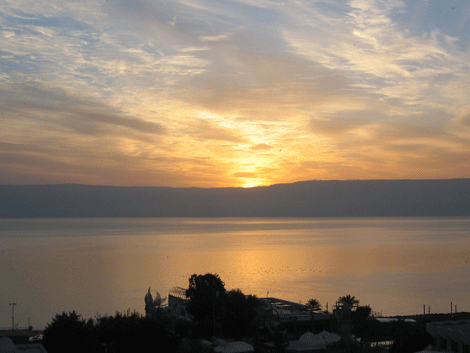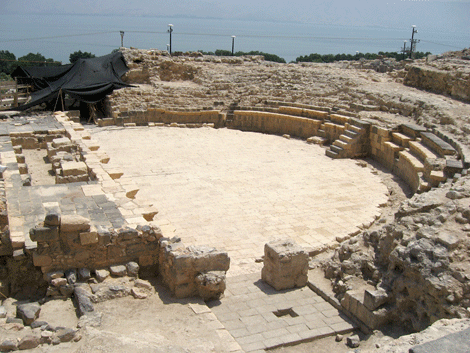|
 |
|
 |
If you scan each of the four gospels, you
will find not even one mention of Jesus
visiting Tiberias. Even though the
ruler Herod Antipas, the one whom Jesus
dubbed "the fox" (Luke 13:32) had
established his capital of the Galilean
district right in Tiberias, next to the hot
springs in 19 AD.
The problem with Tiberias is that it was
considered polluted. Not air
pollution, or water pollution. But
"corpse" pollution. Tiberias had been built
on the shores of the Sea of Galilee over an
older town called Hamat. In fact,
right over Hamat's cemetery. Because
Tiberias had no arable land, Jews from other
cities continued to bring their dead to be
buried there. So then, Tiberias was a
cemetery, even before it was a city! |
|
|
|
 |
|
Copyright
2013 by Gila Yudkin |
|
Map of major towns and
cities in the Galilee of Jesus' day |
|
|
|
The Torah (Numbers 19:11) stated that a
person was defiled after contact with a
corpse and many graves had been uncovered
while the foundations of the city were being
dug. First century AD historian
Josephus in his Antiquities of the Jews
specifically mentions the fact that Jews
were reluctant to live in Tiberias for they
did not dwell or socialize in places where
there were corpses beneath their houses or
public buildings. |
|
|
|
So then, you may ask, how did the "polluted"
city of Tiberias become the major center of
rabbinical Judaism by the end of the second
century?
|
|
|
|
It was all because of Rabbi Shimon bar
Yohai's outspoken criticism of Roman rule.
When one rabbi praised the Romans for their
markets, bridges and public baths, Rabbi
Shimon disputed this by saying, "Whatever
the Romans have done, it is for their own
nefarious purposes. The markets they
established in order to set up brothels, the
public baths for their own pleasures and the
bridges so that their soldiers can get
around more quickly in order to collect
taxes." |
|
|
|
This conversation was reported to the Roman
governor who immediately sentenced Rabbi
Shimon to death. But they had to catch
him first. Rabbi Shimon and his eldest
son escaped the clutches of the Romans by
hiding in a cave. Miraculously a well
of water sprang up and a carob tree gave
delicious fruit to sustain them. In
order to preserve their clothes they would
strip and bury themselves in the sand up to
their necks except for the time of prayer
when they would put on their clothes. All
day long they occupied themselves with the
study of Torah. |
|
|
|
They remained in that cave for 12 years.
One day the prophet Elijah stood outside the
cave and announced, "Rabbi Shimon, the Roman
emperor is dead and all his former decrees
have been annulled." Upon hearing
this, Rabbi Shimon and his son emerged from
the cave. But their bodies were
covered with a skin disease the color of
rust. |
|
|
|
 |
|
Photo:
Gila Yudkin |
|
Tiberias is located on the
western shores of the Sea of Galilee |
|
|
|
They then decided to heal themselves at the
hot springs of Tiberias. When they were
cured, Rabbi Shimon's son asked him, after
all Tiberias had done for them, whether they
should not cleanse it from the impurity
resulting from the presence of corpses. |
|
|
|
So Rabbi Shimon took lupines, a beautiful
blue wildflower from the pea family, sliced
open the pods and scattered the seeds. The
seeds didn't take on dry hard soil, but they
did sprout where the soil was soft and moldy
(where the corpses were). Thus the locations
of the burials were revealed; the corpses
were unearthed and reburied far outside the
city. |
|
|
|
 |
|
Photo
courtesy of Silvia Hess |
|
Wild Lupines from the pea
family, nearly a foot tall |
|
|
|
The rabbis then voted to confirm that Shimon
bar Yohai had indeed purified the city and
that it was "kosher" to live there.
However, there were still detractors and
critics. A Samaritan then living in
Tiberias determined to discredit Rabbi
Shimon. Remember the Samaritans
and the Jews, although living together in
the same cities, had been enemies for
centuries way before the time of Jesus.
This Samaritan secretly placed a corpse in a
spot which had already been cleansed.
He then summoned the people of Tiberias to
expose Rabbi Shimon. |
|
|
|
 |
|
Photo:
Gila Yudkin |
|
Theater in Tiberias from
the 5th-6th century found near the hot
springs |
|
|
|
But Rabbi Shimon approached the spot and in
the spirit of the prophets, commanded "he
who is above to descend and he who is below
to rise." The Samaritan was instantly
transformed into a heap of bones and the
corpse rose to the surface and was removed.
Thus Tiberias' reputation was salvaged and
it subsequently became a holy city for Jews. |
|
|
|
Today, Tiberias enthusiastically invites
Christian and Jewish pilgrims to uncover and
examine the Galilean roots of their faith. |
|
|
|
Copyright 2013 Gila Yudkin. Permission
needed for any reuse. |
|
|
|
Gila Yudkin,
is a Connecticut-born Yankee guiding in
Galilee for over three decades. This last
summer she shared stories of Talmudic
Galilee with a Catholic group studying the
Book of Leviticus. Gila discovered
there's always something new to learn and
pass on! Gila loves working with
groups thirsty for biblical insight,
archeological adventures and old-fashioned
fun. |
|
|

